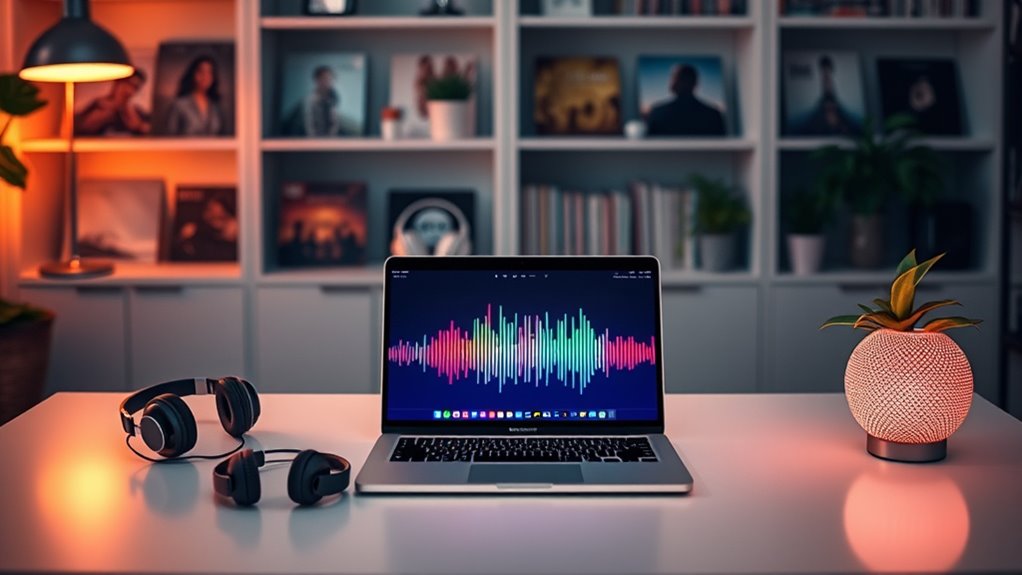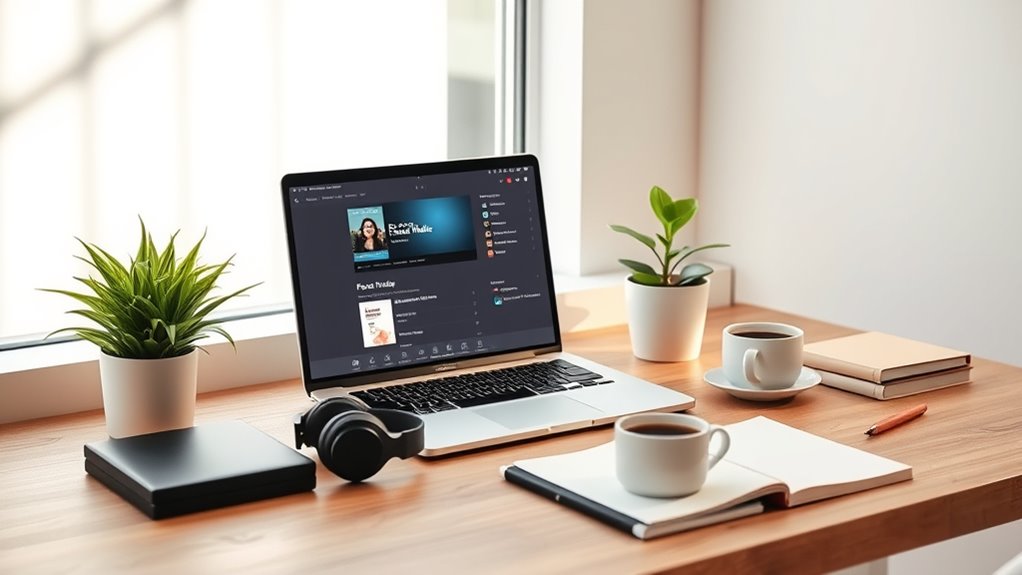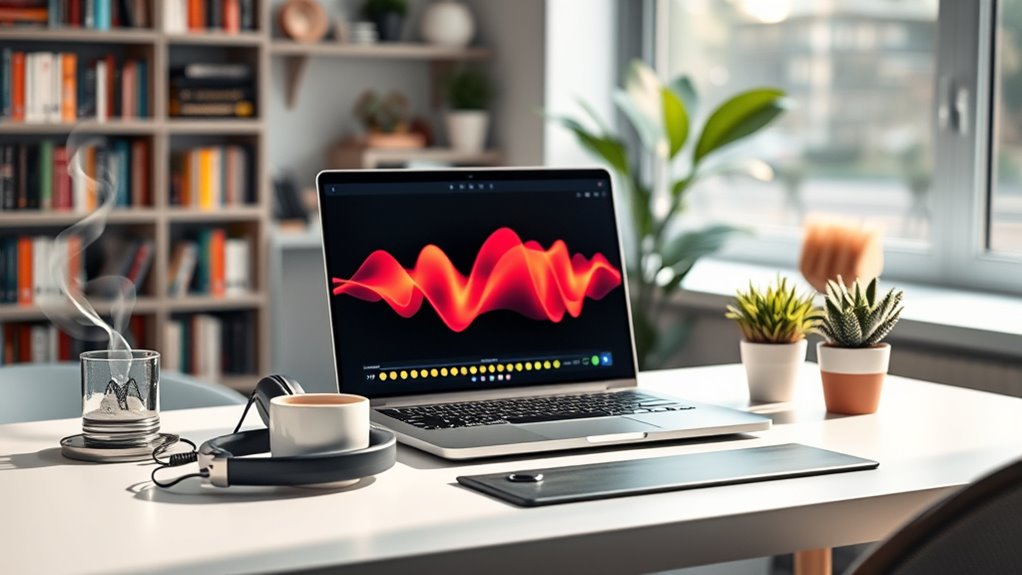If you’re new to focus music for work, it’s important to know that the right sounds can boost your concentration and reduce distractions by syncing your brainwaves with calming, ambient rhythms. Choose music without distracting lyrics, experiment with different genres like instrumental or nature sounds, and set specific times for listening to build a routine. Good sound quality matters—so invest in clear audio. Keep exploring further to discover how to maximize these benefits and customize your focus environment.
Key Takeaways
- Focus music enhances concentration by providing calming ambient sounds and brainwave rhythms, reducing distractions during work sessions.
- Choose instrumental or ambient tracks without lyrics for better focus and avoid sudden tempo changes that can break concentration.
- Incorporate focus music into your routine by scheduling specific times and durations, ideally 30–60 minutes per session.
- Ensure high sound quality and softer audio levels to prevent distractions and maximize listening comfort.
- Combine focus music with productivity techniques like mindfulness or writing tools for optimal mental clarity and efficiency.
What Is Focus Music and How Does It Help?

Have you ever wondered what focus music really is and how it can boost your productivity? Focus music often combines ambient soundscapes with rhythms designed to stimulate brainwave entrainment. Brainwave entrainment uses specific sound frequencies to help your brain shift into states that enhance concentration and mental clarity. These soundscapes create a calming environment, minimizing distractions and helping you stay engaged with your tasks. When you listen to focus music, your brain syncs with the rhythm, promoting alertness and sustained attention. It’s like giving your mind a gentle nudge toward focus without the need for caffeine or other stimulants. By leveraging ambient soundscapes and brainwave entrainment, focus music creates an ideal mental space for work, study, or deep concentration.
Types of Focus Music to Explore

There are several types of focus music you can explore to find what works best for your concentration needs. Ambient sounds are a popular choice, providing calming background noise like flowing water, gentle rain, or cityscapes that mask distractions. Instrumental genres such as classical, jazz, or lo-fi beats offer melodies without lyrics, helping your mind stay engaged without overwhelming you. Electronic ambient music creates a soothing atmosphere, ideal for deep work sessions. Nature sounds, often combined with instrumental music, can enhance focus by promoting relaxation. Experimenting with different types allows you to discover what keeps you most attentive and productive. Exploring soundscapes can help you identify the environment that best supports your focus and productivity during work.
Tips for Choosing the Right Focus Music

Choosing the right focus music depends on understanding your personal preferences and work habits. Consider whether you work better with consistent background noise or prefer silence, as this guides your choice of music. If background noise helps you concentrate, opt for instrumental tracks or ambient sounds that create a subtle, non-distracting environment. Playlist customization is key—curate playlists that match your task intensity and mood, so you’re not overwhelmed or bored. Experiment with different genres, tempos, and soundscapes to find what enhances your focus. Keep in mind that music with lyrics can be distracting for some, so choose accordingly. Additionally, exploring music tuning options such as adjusting sound profiles can further optimize your listening experience. Ultimately, selecting focus music tailored to your needs boosts productivity and makes work sessions more enjoyable.
How to Incorporate Focus Music Into Your Work Routine

To make focus music work for you, start by selecting tracks that suit your tasks and preferences. Next, decide on the best times and durations to listen, whether during specific work sessions or breaks. By planning when and how long to listen, you can smoothly integrate focus music into your daily routine. Additionally, consider creating playlists that incorporate calibration techniques to optimize sound quality and enhance your listening experience.
Choosing the Right Music
Finding the right focus music depends on your personal preferences and the type of work you do. Start by exploring different music genres to see what helps you concentrate best—ambient, classical, lo-fi, or instrumental tracks often work well. Focus on playlist curation by creating or finding playlists tailored for work, keeping them consistent to establish a routine. Avoid songs with distracting lyrics or sudden changes in tempo, as these can break your concentration. Consider using music streaming services with curated playlists designed for focus. Experiment with different styles and durations until you find what suits your workflow. Remember, the goal is to enhance productivity without overwhelming your senses, so choose music that supports your focus. Incorporating Halloween-themed tunes into your playlist can add a festive touch without disrupting your concentration.
Timing and Duration
Once you’ve selected the type of focus music that works best for you, the next step is to determine the right timing and duration for incorporating it into your work routine. Pay attention to the music tempo; slower tempos can promote relaxation, while moderate tempos boost concentration. Decide if you want continuous music during long tasks or short bursts of focus. Keep your playlist length manageable—about 30 to 60 minutes—to prevent fatigue or boredom. You can also schedule specific times for music, such as during deep work sessions or breaks. Experiment with different durations and tempos to find what keeps you most focused without becoming distracting. Consistent use can help reinforce positive habits, making focus easier over time.
Common Myths About Focus Music Debunked

Many people believe focus music can instantly boost productivity, but that’s often a myth. In reality, its effectiveness varies from person to person, and hype can sometimes overstate its benefits. Understanding the facts helps you make better choices for your work routine. Additionally, mental clarity and emotional resilience can be influenced by various techniques like mindfulness and meditation, which may complement or enhance the effects of focus music.
Myths vs. Facts
Despite popular beliefs, not all focus music is equally effective for boosting concentration. Many assume that any music genre, from classical to electronic, will help improve focus, but that’s a myth. The truth is, sound quality plays a vital role; poor audio can be distracting rather than helpful. High-quality sound minimizes background noise and prevents irritation, allowing you to stay engaged with your work. It’s also a misconception that louder music boosts concentration—sometimes, softer, more consistent sounds are better. Different genres can work for different people, but the key is choosing music that’s free of lyrics and abrupt changes. Additionally, research into AI security vulnerabilities highlights the importance of optimized environments—just as secure and reliable AI systems are vital, your focus music setup should be carefully curated for maximum effectiveness. By understanding these facts, you can select focus music that truly enhances your productivity, rather than wasting time on ineffective options.
Effectiveness Overhyped
While it’s tempting to believe that any focus music instantly boosts your productivity, this idea is often overstated. Many overhyped claims suggest that all focus music delivers immediate results, but that’s misleading. Your effectiveness depends on personal preferences, task types, and consistency, not just the music itself. Expecting instant focus from any playlist leads to misleading expectations and frustration.
| Focus Music Effectiveness | Common Misconceptions | Realistic Outcomes |
|---|---|---|
| Boosts focus for some | All music works equally | Works best with routine |
| Doesn’t replace effort | Instant results promised | Needs time to adapt |
| Enhances mood slightly | One-size-fits-all solution | Personalization matters |
Enhancing Your Productivity With Focus Music

Using focus music can especially boost your productivity by creating an environment that minimizes distractions and helps you concentrate on your tasks. Brainwave entrainment plays a key role by syncing your brainwaves to frequencies associated with focus and alertness, making it easier to stay on track. Ambient soundscapes further enhance this effect by providing a calming background that masks disruptive noises. When you listen to these sounds, your mind enters a state of flow more quickly, increasing efficiency and reducing mental fatigue. Incorporating focus music designed with brainwave entrainment techniques and soothing ambient layers can make a significant difference in how effectively you work. It’s a simple yet powerful way to optimize your environment and achieve better results. Additionally, passive voice detection tools can help you refine your writing to be clearer and more engaging.
Frequently Asked Questions
Can Focus Music Improve Concentration for Everyone?
Focus music can improve concentration for many people, but it doesn’t work for everyone. Your response depends on your preferred music genres and how you set volume levels. Some find instrumental or ambient tracks helpful, while others prefer silence. Experiment with different music genres and keep volume levels moderate to avoid distraction. Adjust until you find what helps you concentrate best, since individual preferences vary widely.
Is Focus Music Suitable for All Types of Work Tasks?
Focus music can suit many work tasks, but it depends on your preferences. Different music genres, like classical or ambient, work better for some tasks, while others might prefer instrumental or nature sounds. Personalization options let you customize playlists to match your work style. Experiment with various genres and settings to find what helps you concentrate most effectively, ensuring your focus music enhances your productivity across different tasks.
How Long Should I Listen to Focus Music During Work?
You should listen to focus music for about 1-2 hours at a time, taking breaks as needed. Keep the music volume moderate to avoid fatigue, and use headphones to block out distractions. If you notice your concentration waning, pause or change the playlist. Regularly adjusting the volume and taking short breaks helps maintain productivity and prevents listening fatigue, ensuring you stay focused without strain.
Are There Any Health Risks Associated With Listening to Focus Music?
Listening to focus music is generally safe, but you should watch for music allergies or sensitivities that could cause discomfort. To protect your hearing safety, keep the volume at a moderate level and avoid prolonged exposure to loud sounds. If you notice headaches, ringing, or discomfort, reduce volume or take breaks. Staying mindful of your body’s responses helps prevent any health risks associated with listening to focus music.
What Are Some Recommended Apps or Platforms for Focus Music?
Imagine you’re in a 90s internet café—that’s how you’ll feel exploring these apps. For focus music, try Calm or Brain.fm; they offer diverse music genres and features like customizable playlists, timers, and ambient sounds. Spotify and YouTube are also great, with countless genre-specific playlists. These platforms help you stay productive by tailoring music to your work style, keeping distractions at bay while boosting your concentration.
Conclusion
So, now that you’re officially a focus music connoisseur, go ahead—blast those tunes and pretend you’re in a fancy coffee shop. Who needs quiet when you’ve got a playlist that can turn your chaos into calm? Just remember, if your productivity suddenly skyrockets, don’t forget to thank the music… or blame it when you start dancing at your desk. Either way, your workday just got a whole lot more interesting.









